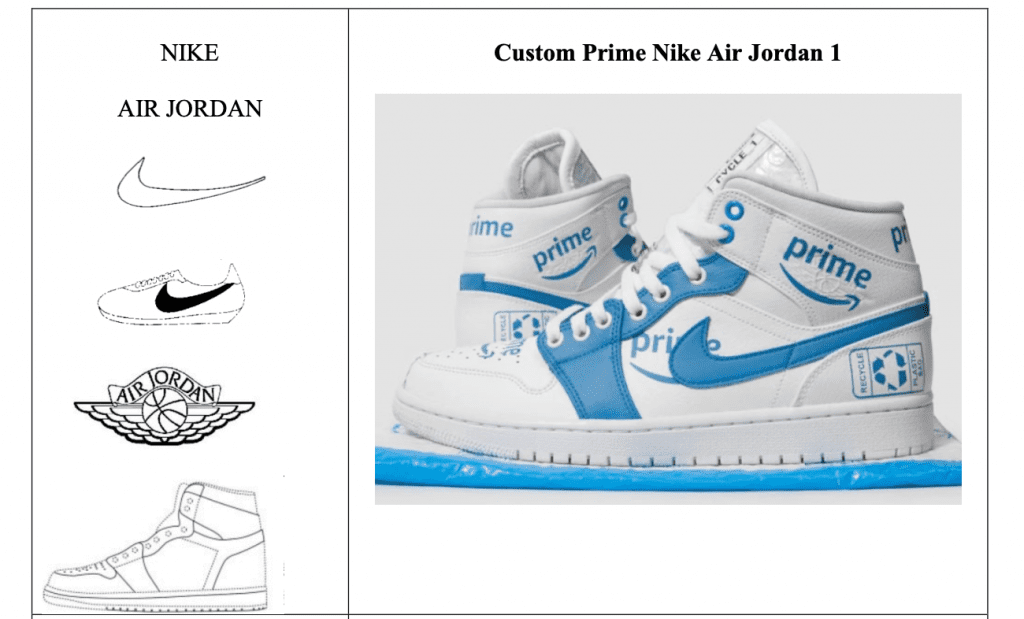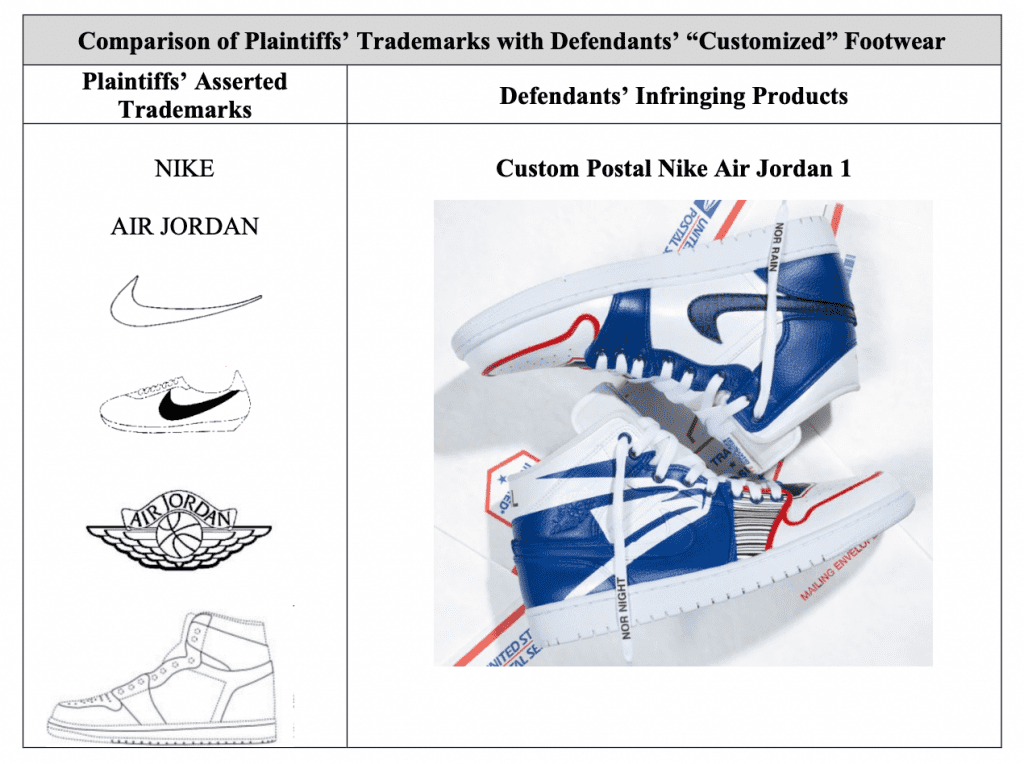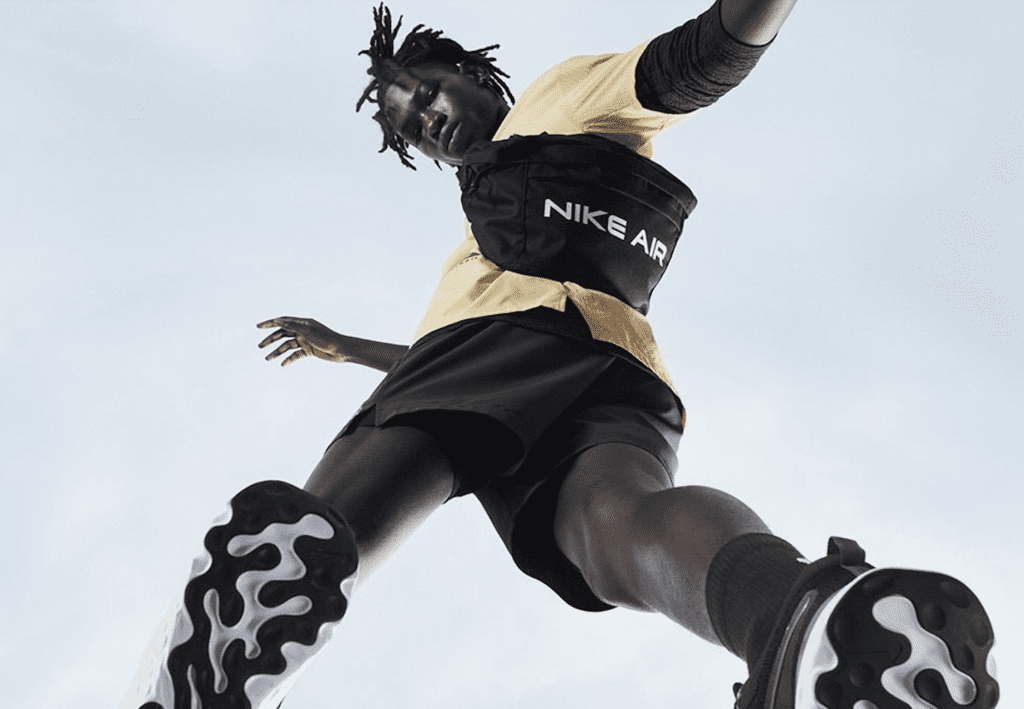The trademark complaint that Nike filed against Customs By Ilene, Inc., dba Drip Creationz is not the only customization-centric lawsuit that it filed this week. Also on Monday, Nike named Jeffrey Waskowiak and KickRich LLC in a similar – but unrelated – suit, accusing them of trademark infringement and dilution in connection with their alleged practice of “reselling Nike and Converse products that have been materially altered in ways that the brands have never approved or authorized,” and thereby, robbing Nike and Nike-owned Converse of their ability to “carefully manage which brands to collaborate with and thoughtfully select where, when, and how often their marks are used to guide the public perception for their iconic brands.”
According to the complaint that they filed in a federal court in Oregon on Monday, Nike and Converse claim that Jeffrey Waskowiak – a former Nike employee – and his company KickRich LLC (the “defendants”) are on the hook for making “custom” footwear products that “combine purportedly genuine Nike shoe soles with uppers fabricated entirely by the defendants,” and that include “reproductions of Nike’s famous Swoosh design and other protected trade dress,” and then selling them for “hundreds or up to several thousand dollars each.”
Nike and Converse allege that the defendants acquire genuine Nike and Converse footwear, such the Air Jordan 1 and Air Force 1, as well as Converse’s Chuck Taylor All Star, and then, “without [their] authorization, alter them in such a manner that [the shoes] constitute new, unauthorized products” over which Nike and Converse “have no control” even though their trademarks “remain intact” on the “custom” shoes. While these allegedly “customized” shoes “may use pieces of genuine Nike and Converse shoes,” the plaintiff argue that the genuine parts are “so altered and combined with non-genuine parts or other brands’ logos that they can no longer be meaningfully considered Nike or Converse shoes.”

In addition to transforming the initially authentic footwear into materially different products that still bear Nike’s and Converse’s trademarks, thereby, presumably removing their ability to successfully invoke the First Sale Doctrine as a defense as a result, the plaintiff footwear companies claim that the defendants make matters worse by offering up “custom” footwear that “falsely affiliates Nike with other brands.” For instance, Nike points to shoes that the defendants promote as the “Custom Prime Nike Air Jordan 1,” which it claims “falsely affiliates Nike with Amazon” by mashing up an authentic Nike Air Jordan 1 shoe, adding a “custom leather lined tongue made from Amazon Prime bubble mailer packaging” and new metal eyelets, and then “applying Amazon Prime branding in multiple locations on the upper right next to the signature Nike Swoosh design.”
Amusingly, Nike also highlights the defendants’ combination of Nike sneakers and U.S. Post Office branding, something that Nike, itself, did this spring, reportedly in an unauthorized capacity at first. The Nike sneakers prompted the USPS to issue a statement distancing itself from the “unfortunate situation” in which Nike, “which aggressively protects its own intellectual property, has chosen to leverage another brand for its own gain.” Despite an initial clash, the parties have since announced an official collaboration.
Not finished, Nike and Converse claim that Waskowiak and KickRich’s “infringement and dilution does not end there,” as they also “make and sell laser cut and digital download ‘shoe patterns’ that allow others to make fakes for several of Nike’s iconic and trade-dress protected footwear styles, including the Air Force 1, the Dunk, and the Air Jordan 1.” Nike and Converse allege that the defendants “represent that these patterns include ‘all necessary shapes for each upper piece, the lining, reinforcements, foams, and heel counter,'” or in other words, “the defendants’ customers purchase these patterns to make their own fake Nike uppers bearing the famous Swoosh design and other protected trade dress.”

And finally, not to be overlooked, Nike and Converse claim that the defendants have created confusion in the marketplace by, among other things, “advertising their infringing products [by] including the plaintiffs’ ‘classic’ or ‘vintage’ logos and slogans,” as well as “references to Waskowiak’s prior employment, which suggests authorization by the plaintiffs.” Here, Nike and Converse are referring to Waskowiak’s nearly 5-year role as a footwear developer for Nike from 2014 to 2019.
As for the alleged damage that is being done to Nike and Converse as a result of such “illegal customizations,” the footwear companies claim that the defendants’ products “dilute [their] trademark rights and they confuse, and are likely to confuse, consumers as to the source, origin, affiliation, and/or sponsorship of the products.” Consumers likely to be confused in an initial sale capacity, per Nike and Converse. Beyond that, though, they interestingly assert that the allegedly infringing products “will continue to cause confusion in the marketplace, including but not limited to … post-sale confusion, and confusion in the secondary sneaker markets,” i.e., in the robust resale market for footwear.
And mirroring some of the language from the Drip Creationz complaint, Nike and Converse assert in the case at hand that the defendants’ unauthorized “customizations” interfere with their “prerogative to choose who [they] collaborates with, which colorways [they] releases, and what message [their] designs convey,” considerations that they claim “are an integral part of [their] branding and quality control over [their] designs.” In this same vein, Nike and Converse claim that such unauthorized customizations limit their ability to control “their brands, business reputations, and associated goodwill, which they have spent decades building.”
Just as in the Drip Creationz case, Nike and Converse set out claims of trademark infringement, trademark dilution, false designation of origin, and unfair competition, and are seeking monetary damages in an amount to be determined at trial, and injunctive relief to bar the defendants from further infringing their marks and/or injuring their business reputations, among other things.
The case is Nike, Inc. and Converse, Inc. v. Waskowiak and KickRich LLC, 3:21-cv-01068 (D.Or.)














